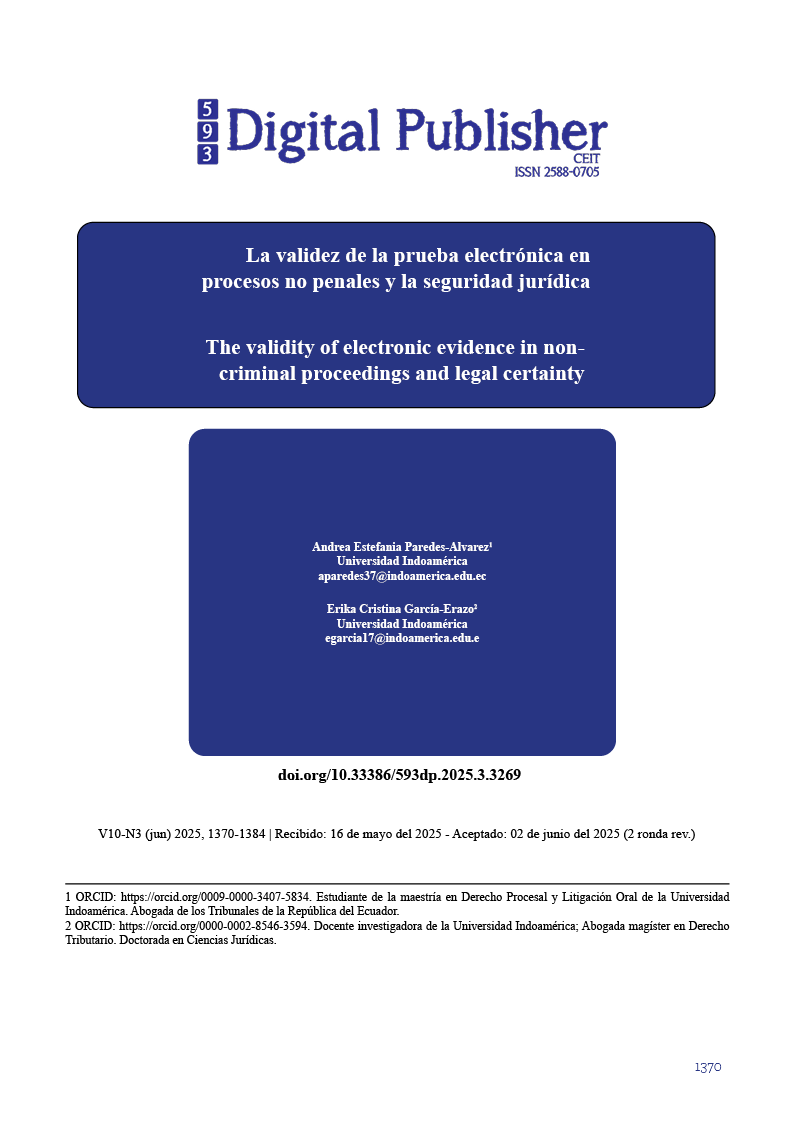The validity of electronic evidence in non-criminal proceedings and legal certainty
Main Article Content
Abstract
Technological advancements have influenced procedural law, as electronic evidence may contain information relevant to legal disputes. This has led various jurisdictions, including Ecuador, to recognize and regulate this type of evidence. However, there are differences between criminal and civil law regarding the codification of electronic evidence. Civil law takes into account certain general aspects for its presentation in civil and non-criminal proceedings, whereas in the criminal domain, specific technical criteria must be met to ensure its validity.
These characteristics are significant, as in practice, they imply that both justice operators and procedural subjects may have technical difficulties when incorporating and presenting electronic evidence. Therefore, the aim of this article is to analyze whether the normative regulation in non-criminal proceedings is comprehensive and allows for clear and prior rules that guarantee elements of the right to legal certainty.
In such a way that the authors have made a systematic verification of bibliography related to the subject, to know doctrinal criteria and analyze the existing norms. With which it is concluded that there is a normative vacuum around the practice of electronic evidence in non-criminal processes that threatens legal certainty in Ecuador.
Downloads
Article Details

This work is licensed under a Creative Commons Attribution-NonCommercial-ShareAlike 4.0 International License.
1. Derechos de autor
Las obras que se publican en 593 Digital Publisher CEIT están sujetas a los siguientes términos:
1.1. 593 Digital Publisher CEIT, conserva los derechos patrimoniales (copyright) de las obras publicadas, favorece y permite la reutilización de las mismas bajo la licencia Licencia Creative Commons 4.0 de Reconocimiento-NoComercial-CompartirIgual 4.0, por lo cual se pueden copiar, usar, difundir, transmitir y exponer públicamente, siempre que:
1.1.a. Se cite la autoría y fuente original de su publicación (revista, editorial, URL).
1.1.b. No se usen para fines comerciales u onerosos.
1.1.c. Se mencione la existencia y especificaciones de esta licencia de uso.
References
Alvear, E. (2020). Validez de la Prueba Indiciaria en el Proceso Penal. Revista Cap Jurídica Central, 4(6), 55-96. https://doi.org/10.29166/cap.v4i6.2495
Asamblea Nacional del Ecuador. (07 de febrero del 2023). Ley Orgánica para la Transformación Digital y Audiovisual, R.O: 245. 2023.
Carnelutti, F. (2023). La prueba civil. Ediciones Olejnik.
Castro, E. (2021). La prueba electrónica en el proceso civil. Diario la Ley. http://rua.ua.es/dspace/handle/10045/113199
Corte Constitucional del Ecuador. (10 de septiembre de 2019). Sentencia No. 989-11-EP/19, [Caso No. 989-11- EP].
Corte Nacional de Justicia. (2017). Apuntes sobre la Prueba en el COGEP. 1er edición.
Delgado, M. 2013. La prueba electrónica en el proceso penal, Diario La Ley, No. 8167
Devis Echandía, H. (2000). Compendio de la prueba judicial. Tomo I. Rubinzal Culzoni Editores.
Devis Echandía, H. (2019). Teoría General de la Prueba Judicial. (6° ed,. Vol 2.) Editorial Temis.
Döhring, E. (2018). La prueba: (1 ed.). Ediciones Olejnik. https://elibro.net/es/lc/utiec/titulos/235103
Egas, J. (2004), Teoría de seguridad jurídica. Iuris Dictio, 5 (8), 13-18. https://revistas.usfq.edu.ec/index.php/iurisdictio/article/view/611/682
Ferrajoli, L. (2004). Epistemología jurídica y garantismo. Distribuciones Fontamara, S.A.
Ferrer, J. Prueba sin Convicción: Estándares de prueba y debido proceso. Marcial Pons, 2021.
Gami, G. (2023). Valor probatorio de los documentos digitales: Con especial énfasis en los documentos electrónicos. Revista de la Asociación de Escribanos del Uruguay, 108 (1-12), 127-140. https://revista.aeu.org.uy/index.php/raeu/article/view/223
Meneses, C.(2008). Fuentes de prueba y medios de prueba en el proceso civil. Ius et Praxis, 14 (2), 43-86. https://dx.doi.org/10.4067/S0718-00122008000200003
Montero, J. 2007. La prueba en el proceso civil, 5a edición, Civitas.
Padilla, G. B. F., & Mayorga, E. C. M. (2024). Los medios probatorios en los actos de proposición en el ordenamiento jurídico ecuatoriano: The means of proof in acts of proposition in the ecuadorian legal system. LATAM Revista Latinoamericana de Ciencias Sociales y Humanidades, 5(2), 777-795.
Pérez, J. E. (2014). La prueba electrónica: Consideraciones.
Pino, G. (2023). Seguridad jurídica, Eunomía Revista en Cultura de la Legalidad, 25, pp. 262-284. https://doi.org/10.20318/eunomia.2023.8000
Prócel, C. (2019). La utilización de herramientas tecnológicas como medio probatorio en procesos laborales. (Tesis de Posgrado) Para la obtención del título de Magister en Derecho Procesal de la Universidad Andina Simón Bolívar. http://hdl.handle.net/10644/7031
Ribeiro, D. G. (2022). La Prueba Digital. En RFB Editora eBooks. https://doi.org/10.46898/rfb.9786558893172.4
Real Academia Española (s.f.). Prueba. En Diccionario de la lengua española. Recuperado en 05 de mayo del 2025, de https://dle.rae.es/prueba
Rivera, B. A. (2021). La prueba electrónica en el proceso civil. http://hdl.handle.net/10045/113199
Taruffo, M. (2013). Verdad, prueba y motivación en la decisión sobre los hechos. México, Tribunal Electoral del Poder Judicial de la Federación.
Vargas, R. (2023). Seguridad jurídica como fin del derecho. Revista de Derecho, 10.22235/rd27.3075
Yepes, M, Pérez, J., & Peinado, M. (2022). Aplicación De La Prueba Electrónica En El Marco Normativo Colombiano. Novum Jus, 16(1), 253-277. https://doi.org/10.14718/novumjus.2022.16.1.11



